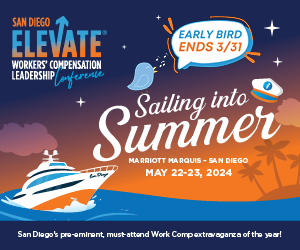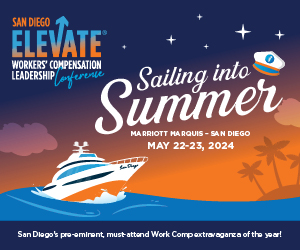Industry Insights
September 29, 2020
Langham: The Burden, the Law and the Uncontroverted
- State: Florida
- - 0 shares
An unheralded recent decision of the Florida 1st District Court was rendered in August: Guerlande v. Delray Beach Fairfield Inn and Suites. The decision was noted in the news, with the import being certain benefits were denied by the trial judge and the court had upheld that outcome.

Judge David Langham
This is an interesting case beyond the denial of benefits for a "12 day period," but that point is worth revisiting also.
That "12 day period" is a reminder of the manner in which Florida workers' compensation benefit entitlement is often dependent upon the opinions of medical experts. When an accident results in an inability to work, disability may be "total." When, instead, the result is activity level or duration constraints, the disability may be "partial," and either category may be so on either a "temporary" or "permanent" basis. It is the medical expert who renders opinions as to both ability and duration.
In Guerlande, the employee was treated the day after the work accident and "placed on work restrictions." About six weeks later, she returned to the physician, who "recommended (a proposed) injection." At that appointment, no work restrictions were imposed and Guerlande was "free to report back" to the doctor "if her conditions worsened."
She in fact returned 12 days later, "elected to get the injection," and "she was again placed on work restrictions." Thus, a 12 day period was created for which there was no medical excuse from work (temporary total) or work restrictions (temporary partial).
The injured worker filed a petition for benefits and did not prevail. The trial judge concluded that, "Guerlande failed to satisfy her burden to show that work restrictions for those 12 days either had, in fact, been imposed or, if not, would have been medically justified." The physician, instead, had "released her to full duty during the 12 day period." On appeal, the court noted that "the JCC’s findings are fully supported by the record."
Thus far, the decision is merely a reminder that physicians' opinions are critical to the determination of benefit entitlement.
The decision has two nuances that provide critical reminders for counsel, however. The court noted the injured worker's attorney argued that, "the 'uncontroverted facts' support her view." That is a strong statement in the realm of appellate challenge. The applicable standard by which an appellate court views facts is called "competent substantial evidence." The question for the court in this analysis is whether there is such evidence to support a trial judge's finding of fact. I explain this to my students as follows:
"100 people witness an event. 99 of them testify the traffic signal was red and one testifies it was green. If the judge or jury concludes the light was green, the testimony of that one witness is competent substantial evidence."
The point for the appellate court is not that there were more witnesses who contradicted the finding. The point is whether any competent evidence supports the conclusion that was reached. Thus, since the court's analysis is whether there is such competent evidence, a statement that any evidence is "uncontroverted" is, in fact, an assertion that no evidence supports an opposite conclusion. When representing to a court that something is "uncontroverted," one should be sure that is true.
The court noted the contention in Guerlande "that the 'uncontroverted facts' support her view," as noted above, but corrected the assertion saying, "that is not accurate because the facts were disputed and resolved against her." That some party believes one fact or version of facts does not make them "uncontroverted." That one version is supported by 99% of the evidence (in a party's view) does not make them "uncontroverted."
There are often disputes between evidence, and determining which of those competing facts is accurate is the role of the finder of fact (in workers' compensation, the trial judge, but in some proceedings, the jury). Parties to a case should be reticent about making characterizations that are not true. Certainly, some speak in hyperbole and seek to make their best case. But representing something to be "uncontroverted" when there is contrary evidence is perhaps not the best strategy and may even erode credibility.
The second reminder for which Guerlande is apropos of the burden that faces an injured worker seeking benefits. Statute section 440.09(1), Fla. Stat. (2018) requires that “[D]isability must be established to a reasonable degree of medical certainty, based on objective relevant medical findings,” as the court noted. It also acknowledged that the injured worker denied being able to work and stated as much to two physicians.
However, "they (the physicians) were each unconvinced, which was their prerogative. See § 440.09(1), Fla. Stat. (2018)."
This is important from either perspective, worker or defense, An employee or employer may have beliefs about whether an injury impairs the ability to work (ability level or duration), but the opinion that matters on that question is the medical opinion(s) and the "objective relevant medical findings" that support whatever that conclusion/opinion is. This last requirement has not always been part of the Florida workers' compensation statute, and that is the third nuance worth reminding.
The court noted that the "objective medical findings" requirement was added to the statute in 1994. Thus, it was that statute section that applied to the benefit entitlement in this case because the date of accident was after that law was enacted. The court conceded that there are decisions regarding cases occurring prior to that change that suggest a different outcome. But those decisions interpreting a different statute version do not control the outcome of this case and the interpretation of this statute.
The law of workers' compensation is, thus, significantly nuanced. There are many appellate decisions and trial decisions that interpret the statute. However, parties and attorneys must remain focused on what version of the statute a particular decision addresses. For this reason, it is also of significant importance for judicial decisions to include a reference to the specific date of accident that is being litigated (or for statutory citations in such decisions, to specify the year of the statute considered or relied upon).
In the end, the primary reminders of Guerlande are: (1) know the specific statute that controls a question, and address the elements of that particular statute in both evidence and argument; (2) medical testimony is critical on certain specific elements of proof; know when and obtain/present it; (3) hyperbole may not serve to move an issue forward and should be carefully employed if at all; and, (4) even when evidence is contradicted, the trial judge or jury will decide which version is accepted, and the existence of that competent, substantial evidence may be the end of an appellate analysis.
David Langham is deputy chief judge of the Florida Office of Judges of Compensation Claims. This column is reprinted, with his permission, from his Florida Workers' Comp Adjudication blog.
Advertisements
Columns
- Montgomery: Sedgwick Tries PPO Discount for Med-Legal (Again) 04/19/24
- Kamin: More Policy Exclusions Would Reduce Losses 04/18/24
- Phillips: It's All Settled 04/17/24
- Snyder: Public Benefit Rules Have Changed, but It Might Not Make a Difference 04/12/24
- Headrick: Clearing Up a Common Misconception 04/11/24
- Snyder: Litigation Guidelines Should Define Four Settlement Triggers 04/10/24
- Kirsch: Depositions of Comp Carrier Employees After Intervening in Third-Party Actions 04/09/24
- Wilson and Bennett: Could AI Have Prevented the Opioid Crisis in Workers' Comp? 04/08/24
- Moore: Pandemic Effect Over in March 2027. Really? 04/05/24
- Geaney: A Brief History of Our State's Workers' Compensation Act 04/04/24
- Kamin and Larres: Significant Panel Decision Clarifies Recon Confusion 04/03/24
- Gelman: Exposed to 'Forever Chemicals' 04/02/24
- Montgomery: Cyberattack Delays Payment of San Francisco Bills 04/01/24
- Young: Indoor Heat Regs in Turmoil 03/29/24
- Langham: Shootings and Compensability 03/27/24
- Geaney: Third-Party Liens Not Always Due Right Away 03/26/24
- Larres: State Supreme Court Denies Review of Our Appellate Win 03/25/24
- Moore: Recordkeeping and Your Remote Premium Auditor 03/22/24
- Switzer: Important Change Coming Soon 03/21/24
- Moore: Basic AI Claims Adjuster Assistant Works Well 03/19/24
Now Trending
- Workers' Compensation News
-
Calif.
Chiropractor Sentenced to More Than
54 Years, Fined…
Posted on Apr 16, 2024
-
Calif. Court
Upholds Summary Dismissal of
Worker's Claims for Retaliation,…
Posted on Apr 17, 2024
-
Calif. Contractor
Pleads Guilty to Underreporting…
Posted on Apr 15, 2024
-
Calif. WCIRB
Approves Recommendation for 0.9%
Rate…
Posted on Apr 18, 2024
-
Calif. Committee
Passes Bill to Revise Poster…
Posted on Apr 19, 2024
-
Ill. Worker Who
Repeatedly Failed to Appear at
Hearings Can't Get Claim…
Posted on Apr 15, 2024
-
Fla. State Joins
Texas in Prohibiting Local
Workplace Safety…
Posted on Apr 16, 2024Joe Paduda says: “All of us in the Worker’s Comp. industry should push to improve…”
-
Neb. Lawmakers
Send Schedule Rating Bill to…
Posted on Apr 15, 2024
-
N.Y. Court: Worker
Should Have Been Denied Leave to
File Late…
Posted on Apr 17, 2024
-
La. Court
Overturns PTD Award for Worker With…
Posted on Apr 17, 2024
Jobs
Upcoming Events
May 5-8, 2024
Risk World
Amplify Your Impact There’s no limit to what you can achieve when you join the global risk managem …
May 13-15, 2024
NCCI's Annual Insights Symposi
Join us May 13–15, 2024, for NCCI's Annual Insights Symposium (AIS) 2024, the industry’s premier e …
May 13-14, 2024
CSIA Announces the 2024 Annual
The Board of Managers is excited to announce that the CSIA 2024 Annual Meeting and Educational Con …
Social Media Links
c/o Business Insurance Holdings, Inc.
Greenwich, CT 06836





No Comments
Log in to post a comment